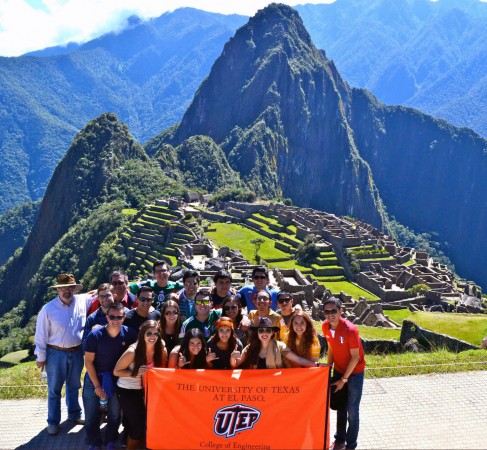Originally published September 12, 2014
By Andrea Acosta
UTEP News Service
There and Back Again: With a gentle nod to J.R.R. Tolkien’s The Hobbit, this is the first article in an occasional series covering the off-campus experiences of UTEP students with study abroad, internships and externships, because what students learn outside the classroom is as important as what they learn inside the classroom.
The University of Texas at El Paso’s College of Engineering has developed a way to support engineering students interested in studying abroad by using faculty-led programs and international agreements to ensure students complete their degrees on time.

With six hours of electives, engineering students often feel they do not have the time for a global education. This sense of the improbability of leaving campus is reflected in the Institute of International Education’s (IIE) study that revealed only four percent of engineering majors in the U.S. study abroad.
One solution to the strict course plan engineering students have to follow is shorter, faculty-led programs. The Global Programs Office in the College of Engineering runs a faculty-led study abroad program in Peru on global and regional sustainable engineering that lasts approximately three weeks in the summer. UTEP’s Study Abroad Office offers similar short-term, faculty-led programs.
Another solution is for students to take advantage of international agreements between UTEP and other universities. The Global Programs Office develops these international agreements to make it possible for students to more easily transfer credits back to UTEP, so the classes they take abroad will still count toward their degrees.
“Students get a better experience in their career and more courses they can pick from that will ultimately count toward their degree,” said Rosa Meguerian-Faria, global outreach manager at UTEP’s Graduate School. “Thanks to the scholarships provided to them, it is now easier for students to not worry about the financial aspect (of studying abroad). Faculty also have the resources to apply for grants to support and fund students interested in studying abroad.”
UTEP has international agreements with universities in Chile, the Czech Republic, Germany, Italy, Mexico, Nicaragua, Peru, Slovakia and South Korea, among others.
“Globalization of the engineering profession is now a reality,” said Carlos M. Ferregut, Ph.D., director of the Global Programs Office and a professor of civil engineering. “We are excited to provide our engineering students with opportunities to develop the skills that are needed to work as members of multinational and multidisciplinary teams. Our current goal is for at least 10 percent of the students in the College of Engineering to have an international education, research or work experience by the time they graduate.”
Currently, there are 88 engineering students studying at UTEP from universities in Brazil, the Czech Republic, the Dominican Republic, South Korea and Spain.
These international agreements also create new degrees between universities. For instance, the College of Engineering has an agreement with the Czech Technical University in Prague for a transatlantic dual master’s program in transportation and logistics systems, and Seo Kyeong University in South Korea developed a dual bachelor’s degree in metallurgical and materials engineering with a nanoprinting engineering option.
One student enjoying the benefits of an international agreement is mechanical engineering student Lauro Pessoa, who arrived from Brazil in January 2014 and has enjoyed the culture and lifestyle in El Paso for the past nine months, in addition to the professors’ dedication toward their students.
In May, after completing his first semester at UTEP, Passoa was offered a research assistant position at the W.M. Keck Center for 3-D Innovation.
“In Brazil, professors don’t hold office hours for the students, so there is never a close connection that we can establish with them,” Pessoa said. “Research positions are scarce and limited. They are only given to students who have gained valuable knowledge in their major, therefore they are very competitive. With my current research position, I’m gaining a lot of experience that will help me when I return to Brazil, not to mention the opportunities I will be able to take part in due to my year studying abroad.”
UTEP students like Juan Carlos Muñoz also gain from international experiences. Muñoz is an engineering master’s student studying abroad this fall in Rio de Janeiro, Brazil. As an undergraduate, Muñoz traveled to Melbourne, Australia. This past summer, he had an internship in Beijing, China.
“(The Global Program Office in the College of Engineering) provided me with help and encouragement,” Muñoz said. “Studying in another country is a tremendous opportunity to interact with students and researchers from diverse backgrounds. It’s an opportunity that allows us to improve our communication capabilities, which is one of the major characteristics that engineering companies are looking for when recruiting.”
Muñoz said he has valued his study abroad experiences and appreciated the scholarships available for students in the process of studying abroad.
“I have gained a new set of skills around my adaptability, cultural factors and communication within international teams,” he said. “It has been helping me in the globalized society that we live in – cultural skills are becoming more valuable for engineers.”
Editor’s note: If you have a story or an experience you think would fit this series, please email news@utep.edu with the subject line: There and Back Again.
